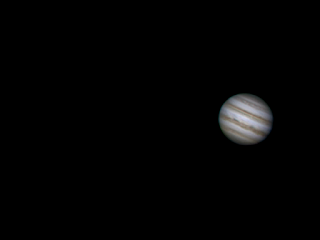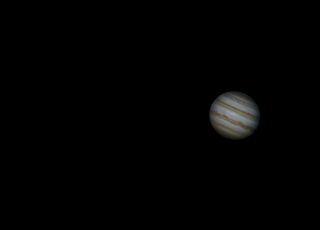Early morning treat 2-25-16, the Moon was setting over the San Jacinto peak so I snapped a single exposure of the event with my LG G4. The early morning Sun was starting to rise in the east, and the Moon was beginning its decent over the mountain top to the west.
The general purpose of this blog is to highlight the potential of astronomy and astrophotography in the Coachella Valley, CA and surrounding areas
Saturday, February 27, 2016
Friday, February 19, 2016
Reprocessed 2-4-16 image of Jupiter with PIPP and Autostackkert 2
Finished reprocessing my AVI from 2-4-16 of Jupiter using PIPP and Autostackkert 2. I am surprised at the extra detail I was able to pull out of the video. PIPP (Planetary Imaging Pre-Processor) does an outstanding job of pre-processing images before you start stacking them in Registax, Avistack, or whatever software you might be using for stacking planetary images. PIPP auto crops the frames and chooses only the best of the best and creates a new AVI video of the end results.
I have mixed results with Autostakkert 2, and usually prefer to use either Registax or Avistack for stacking purposes. The old image was processed with Avistack. This time around, Autostakkert seemed to do the job much better. Afterwards, I still loaded the stacked image into Avistack and played around with the wavelets, but that was more of a personal preference.
I have mixed results with Autostakkert 2, and usually prefer to use either Registax or Avistack for stacking purposes. The old image was processed with Avistack. This time around, Autostakkert seemed to do the job much better. Afterwards, I still loaded the stacked image into Avistack and played around with the wavelets, but that was more of a personal preference.
New reprocessed image of Jupiter
Old processed image of Jupiter
Labels:
autostakkert,
avi,
avistack,
California,
coachella,
coachella valley,
Jupiter,
Night sky,
palm springs,
pipp,
planet,
planetary imaging,
registax,
reprocessing,
socal,
spc900nc,
webcam
Thursday, February 11, 2016
Jupiter in the Coachella Valley, CA night sky 2-4-16
Jupiter just keeps getting bigger and brighter as the days pass, inching its way to opposition on March 8, when it will be at its closest approach to Earth and its face will be fully illuminated by the Sun. It will be brighter than any other time of the year, peaking at an apparent magnitude of -2.49, and will be visible all night long. This is a great time to get outside and observe Jupiter and its Moons, as the weather here in the Coachella Valley has been lovely, and seeing conditions have been favorable.
These images were taken on 2-4-16 and the seeing was excellent that night. Equipment used was a Celestron Nexstar 6SE + Phillips spc900nc webcam and a 2x barlow
These images were taken on 2-4-16 and the seeing was excellent that night. Equipment used was a Celestron Nexstar 6SE + Phillips spc900nc webcam and a 2x barlow
And lastly, I would like to congratulate the @LIGO team for directly detecting Gravitational Waves today #einsteinwasright
Labels:
Amateur astronomy,
astronomy,
astrophotography,
California,
coachella,
coachella valley,
Gas giant,
Jupiter,
nexstar,
planet,
spc900nc,
webcam
Coachella Valley Crescent Moon 2-10-16
Snapped a picture of the crescent Moon last night and thought I would share it with my followers. It was a great night for stargazing here in the Coachella Valley, and the Moon did not disappoint. The crescent Moon is always my favorite phase of the Moon. I tend to picture in my head a Cheshire Cat smiling down on me from above, but unfortunately I have yet to see it manifest into an actual cat. Maybe someday right?
Thursday, February 4, 2016
My second attempt at photographing the Orion Nebula M42 2-4-16
This is my second attempt at photographing the Orion Nebula. My first attempt went well, with my limited equipment and abilities. This time around, I was pleasantly surprised with what I was able to capture, and with a phone camera no less! The LG G4 is truly an amazing piece of machinery, and has a fantastic camera for astrophotography.
There is a bit of star trailing and other imperfections, but overall a huge improvement over my first try here. I used a Celestron Nexstar 6SE with a phone adapter and the G4 attached. Camera settings were 4 x 30s exposures ISO 250. The 4 images were stacked in Deep Sky Stacker, and some light editing in Photoshop to help bring out more of the gaseous details. Unfortunately, there are some star trails and doubling of stars, but this will be worked out as I get better with the editing process.
Isn't the Coachella Valley a beautiful place for Astronomy and Astrophotography? Enjoy the night skies!
There is a bit of star trailing and other imperfections, but overall a huge improvement over my first try here. I used a Celestron Nexstar 6SE with a phone adapter and the G4 attached. Camera settings were 4 x 30s exposures ISO 250. The 4 images were stacked in Deep Sky Stacker, and some light editing in Photoshop to help bring out more of the gaseous details. Unfortunately, there are some star trails and doubling of stars, but this will be worked out as I get better with the editing process.
Isn't the Coachella Valley a beautiful place for Astronomy and Astrophotography? Enjoy the night skies!
Final edited image
RAW image from camera
Subscribe to:
Comments (Atom)












